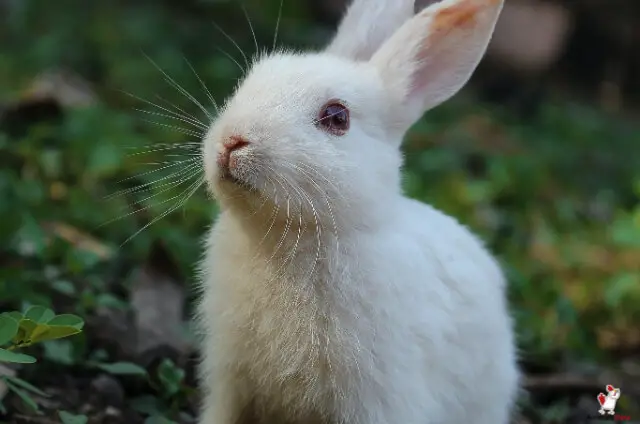Well, while rabbits can eat coconut, there’s not supposed to. And the reason why these drupes should get near the rabbit hole is their nutritional denseness. Coconuts have high levels of fibers, sugars, minerals, and vitamins, some of which the rabbit will find challenging to digest. So, could you not do it?
This article will open you up to the nitty-gritty details and all the vital info on rabbits and feeding coconuts to them.
The Specifics
As noted, coconuts are full of nutrients. In that connection, I have prepared a table to show you how dense coconuts are, nutritionally speaking:
| Nutritional Content | |||
| Nutrient | Quantity (mg) | Nutrient | Quantity |
| Thiamin (Vitamin B1) | 0.067 | Riboflavin (Vitamin B2) | 0.02 |
| Niacin (Vitamin B3) | 0.53 | Pyridoxine (Vitamin B6) | 0.053 |
| Folate (Vitamin B9) | 26 (mcg) | Vitamin C | 3.4 |
| Vitamin E | 0.25 | Vitamin K | 0.2 (mcg) |
| Calcium | 14 | Magnesium | 32 |
| Iron | 2.44 | Phosphorus | 112 |
| Potassium | 357 | Zinc | 1.2 |
| Sodium | 20 | Sugar | 6.24 |
| Dietary fiber | 9 | Carbohydrates | 15.22 |
| Fat | 23.48 | Protein | 3.33 |
With that tabulated data, you might be asking yourself this – why can’t rabbits eat coconuts, and yet they are so nutritious? Well, I’ll tell you what – coconuts are a little too good! A rabbit’s digestive system is not as complicated as that of a human, and so, the little bunny won’t digest the nutrients quickly.
The best way to understand is by putting things into perspective. First, let us study the content of a rabbit’s diet. For a wild rabbit, the diet is mostly plant-based, with most of the plants being dry and moderately nutritious. Other breeds and pet bunnies eat dried grass, you know, the different types of hay. If you look at those simple foods, you realize that coconuts are a little too much to chew, let alone swallow.
Let me voice it differently. Coconut is high in acids, fats, sugar, and phosphorus. This implies that the presence of coconuts slices in the rabbit’s stomach will be immensely reactionary. The rabbit may suffer from GI issues like diarrhea, nausea, vomiting, and dehydration. You wouldn’t want your little pet bunny to have things difficult, now would you?
What About Coconut Milk?
Coconut milk has nothing to do with regular cow’s milk. It is extracted from the grating of the coconut’s shell. The liquid is usually opaque, thickly-white, and fatty. It tastes like cream, and in many parts of Southeast Asia and East Africa, it is used in some cuisines.
Coconut milk is good for humans, but it is a no-no for rabbits. The saturated fat in the coconut milk will be difficult for the rabbit to breakdown. When the bunny’s tract is overwhelmed, its health could be hanging in the balance. All that is terrible news – period.
What About Coconut Water?
When you break the hard outer surface and open a coconut up to the world, some sharp-tasting liquid pours. All over the world, it is enjoyed as a popularly healthy drink that helps in metabolism-boosting, hydration, and cardiac health promotion. Because of its fatty lowness, it can also help people lose weight. But can it serve rabbits as well as it does people?
Coconut water has a sharp taste because of its acidic content. Too much acid in the rabbit’s system can trigger GI issues that may cost you a fortune treating. So, you’d better look away from it.
What About Coconut Shells?
As a person who has seen, touched, and felt a coconut’s outside, I’ll shoot out a quick no. Rabbits have tough teeth, but coconuts shells are tougher. Actually, no creature – none that I know of – could think of eating coconut shells. When you give a rabbit a coconut shell, it will try nibbling on it for a while before giving up.
What About Coconut Oil?
Unlike coconut milk which only comes from the fleshy parts of the fruit, the oil can be extracted from different parts. The oil can come from the milk, the palm, the fruit, or even the branches. As a fan of this type of oil, I know that it has industrial and kitchen properties.
It is important to note that the oil’s fat content can be detrimental to people. If that’s the case, do you think rabbits should eat (or is it drink) it? Definitely not! The rabbit’s digestive system is delicate and cannot break down the high saturated fat content in coconut oil.
What About A Coconut Tree’s Leaves?
Well, first of all, rabbits cannot reach the leaves of a coconut tree because of its tallness. However, if the leaves were near the rabbit’s mouth, would it be okay if they got ingested? The truth is, there isn’t much out there to tell us if that is okay or not. However, my recommendation is that since it is a no-no for the other parts of the coconut, let it be so for the leaves.
This erring on the side of caution doesn’t mean that all tree leaves are unsafe for rabbits. But since some could be harmful, it is better than all the others remain out of the green-lights camp. Do not feed your rabbits things that you haven’t yet tested, and every new thing should first get a professional’s go-ahead. The trees whose leaves are rabbit-safe include the pear, hawthorn, hazelnut, apple, juniper, spruce, rose, maple, and pine.
FAQS: Can Rabbits Eat…?
1. Cauliflower?
It is okay, safe, and healthy to feed rabbits with cauliflower. However, the rabbit’s mouth shouldn’t be stuffed with them, and they should only be served moderately. If you give a rabbit too much cauliflower, expect to deal with GI issues.
2. Papaya?
This is the right, green choice if you’re looking for a long-term fruity treat for your dog. It has anti-inflammatory properties, is full of nutrients, and assists in making digestion easier.
And it’s not all about the fruit. The rabbit can also eat the leaves and the outer skin. The only thing to do is to ensure that those parts are clean.
3. Onions?
I’ll jump in with a quick fat no. None of the members of the family called allium (chive, shallot, garlic) should get near a rabbit’s mouth. The worst-case scenario is that the rabbit could get hemolytic anemia, meaning that its red blood cell count could go down badly.
4. Lettuce?
On the surface, lettuce is good. Actually, I can argue that it is the best leafy greens to give rabbits. However, not all of them are safe. For example, the lettuce known as iceberg lettuce has a harmful chemical known as lactucarium. If the rabbit has too much of the chemical, it could develop weakness, diarrhea, and other GI issues.
Final Worlds
You shouldn’t give coconuts to rabbits– they’re too much. It’s a bummer that you can’t feed them because they are so nutritious. But tell you what – there’s something you can do with coconut shells! Clean them up and give them to the rabbits – those bunnies will love playing with the hard toys.

I’m Christopher Benjamin, a dedicated Animal Nutritionist at Ethos Veterinary Health with a Bachelor of Science in Animal Science from Michigan State University. My lifelong passion for animals led me to establish AnimalsData.Com. Here, I share expert advice, educational resources, and inspiring stories to empower fellow pet lovers worldwide. Join our community as we celebrate the beauty and diversity of our beloved animal companions!
